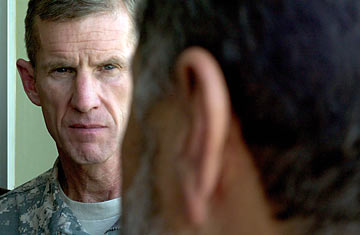
Following the murder of the chief of police and an outbreak of fighting by insurgents in the city's streets, General Stanley McChrystal, newly appointed head of forces in Afghanistan, is briefed by an Afghan National Army commander at a base in Kandahar
(2 of 7)
What has been the reaction among your men?
I am sure there have been concerns by any force that says, If you limit their range of operations, then they are going to have to naturally rethink how they operate. For some, that is no change from where they have been going with this. And I think that is evident in some of the success they have had. But others may have to maybe rethink a conventional approach that they might have had before. It's a tough war, a very tough war.
How are you going to get that message down to the guys in the fight, who are used to depending on air support?
Well, one, we have an extraordinarily intelligent and mature force now. We have had for a number of years. The way I would frame it to them is, Suppose the insurgent occupies an enemy home or village and engages you from there, with the clear idea that when you respond, you are going to create collateral damage. He's going to blame that on you. Even if you kill the insurgent there — and in many cases you don't, you just destroy a lot of things — you get a tactical success and near-term satisfaction because you went after the fly with the sledgehammer. What happens is, you have made the insurgency wider. You are going to run into more IEDs (improvised explosive devices), you are going to run into more insurgents, you are going to run into a more difficult place. At the end of the day you are going to suffer more casualties. Our effort is going to be harder and potentially unsuccessful. So what I am asking them to do is just step back and take a more strategic look and try to put themselves in the position of the Afghan people.
I know that is something we say easily, but if you really put yourself in the position of someone who is living in a small village, they may have been coerced or at least influenced by the insurgents. When you arrive, they are uncertain about you — they don't know you either. They are not automatically going to run out and embrace you, because, one, they have seen a lot of people come and go before. Many saw the Russians come and go. And so they are naturally cautious. And if they associate your arrival with damage and death, they are probably more cautious than that. So this is exceptionally complex stuff. It is not just as easy as being good people and they are going to love us. You've got to convince them with actions over time.
Last week you delivered a firm directive to your commanders in a morning brief. There had been an incident in which civilians were killed when soldiers ordered a strike on a compound from which they were receiving fire. In the brief you ordered your commanders to "stop dropping compounds." Can you tell me more about this?
What we have done is written a tactical directive. And it provides my intent on how we are going to execute operations in general [to be released soon]. But specifically, the use of deadly force. The reason I spent a lot of time personally writing that intent is because I wanted to make sure that before they went into the specific dos and don'ts, that they understood the framework and the concept behind it. And the concept behind it is that although you are still authorized to use close air support when you need to — and I lay out some very specific conditions that they must meet to do that; we don't take it away because there are those unique conditions where you need to do it, and I am not going to put the force in a position where they don't have those available when those conditions arise — but, in this case, I was referring back to a couple of cases where they had met the conditions and they had engaged compounds, and I said, "O.K., everybody, I am not going to argue over your decision over each compound, but I am going to go back to my intent, and my intent is, Stop dropping compounds." Because it is not just civilian casualties. It's also, if we go into an area to save it, and when we have finished saving it there is tremendous physical damage, I am just not sure that if I were an Afghan villager I would associate us with liberation.
What I know after a very extensive time both here and in Iraq is, if you don't put yourself in their shoes and you oversimplify what they might think, you are just wrong.
There has not been blowback. In fact, almost everyone I talk to says, I absolutely understand where you are going, and we understand what we are trying to do. Sometimes people say, But what if...? I just go back and I say, We put instances in the directive where in certain cases if you have to use it, you can.
